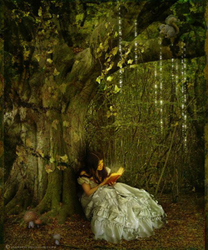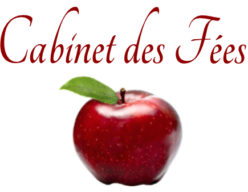by Emerald Lugtu
 Il était une fois…
Il était une fois…
Era uma vez…
C’era una volta…
Es war einmal…
Det var en gang…
Once upon a time…
No matter what language you speak, all of us can remember those words that begin fantastical adventures. Most of us, too, can remember the fuzzy feeling that settled over us like fairy dust by the time the story ended. Perhaps that is reason enough why fairy tales are important, because they make us happy.
There have been great societies that did not use the wheel, but there have been no societies that did not tell stories. — Ursula K. LeGuin
Looking back, I begin to realize exactly how flawed the fairy tale heroes and heroines are. After all, Jack (the one affiliated with the beanstalk) was a thief, and the Princess (the one associated with the pea) wasn’t a very gracious guest by complaining to the queen about her uncomfortable sleeping arrangement.
Yet, fairy tale characters still inspire us to root for them. Why? Because they’re human and because when we look at them, we see ourselves. When we see ourselves in these characters, we see mistakes that we’ve made and the risks that paid off, all without feeling like we’re being overly preached to.
Yes, sometimes fairy tales are the best way to stomach lessons. There are the obvious ones, like don’t take apples candy food from strangers (Snow White), don’t forget to invite everyone to your party (Sleeping Beauty), everything’s not as it seems (Beauty and the Beast), and read the fine print when signing contracts (Rumpelstiltskin). Then there are the less obvious lessons, like always remember to pack snacks when you go into the woods (Hansel and Gretel) and all those hours spent playing charades might not be wasted (The Little Mermaid).
If you don’t know the trees you may be lost in the forest, but if you don’t know the stories you may be lost in life. — Siberian Elder
In return for making us look at our dark side, fairy tales give us a chance to see ourselves triumphant. They let us beat our foe, they let us see that people who have it tough can succeed, and they let us find our unicorn. Fairy tales give us a chance to say ‘˜I’m brave! I can handle this!’ All of us like to think that, given the chance, we would have tamed the dragon. We would have gone to the ball. We would have been the one to pull the sword from the stone.
What if? Would we? There are so many questions that come after ‘˜once upon a time’; questions that will stick with you long after the words ‘˜happily ever after’ have been read.
Not only do fairy tales let us do the right thing, they let us be a hero. Which, in this world, can be the same thing.
“The story does not contain the answer, it is the answer.” — Brian Wicker
“If you want your children to be intelligent, read them fairy tales.” Albert Einstein is quoted as saying. “If you want them to be more intelligent, read them more fairy tales.”
Sometimes fairy tales give us good ways to see ourselves. And sometimes they don’t. Sometimes fairy tales let us see ourselves in the less-than-favorable light. We can examine ourselves in each character. How far would we take our hate? (Hopefully not far enough to start poisoning apples!) What would we do to get what we want? How many people do we pass, do we take for granted, without giving them a chance? (Granted, there is a high chance that the old woman you passed is not a fairy, but she could be, say, an eccentric millionaire.)
“At the center of every fairy tale lay a truth that gave the story its power.” — Susan Wiggs, author
Some have brought out the point that fairy tales are ridiculous because they don’t deal with real life; that wishes on stars don’t come true and that people who fall down rabbit holes sprain their ankle instead of having tea parties with mad hatters. That’s a well-made point. But reading fairy tales isn’t a study guide for what to do (or not to do) when a giant beanstalk grows in your back yard. Those parts of fairy tales aren’t true. But some parts are. “Fairy Tales are more than true; not because they tell us that dragons exist,” English writer G.K. Chesterton says, “but because they tell us that dragons can be beaten.”
Fairy tales give us a chance to escape, a chance to renew our faith, and a chance to conquer whatever we’re fighting. “Fear isn’t so difficult to understand. After all, weren’t we all frightened as children?” Alfred Hitchcock is recorded as saying, “Nothing has changed since Little Red Riding Hood faced the big bad wolf. What frightens us today is exactly the same sort of thing that frightened us yesterday. It’s just a different wolf.”
Perhaps fairy tales are hard to believe, not because of all the Pegasus flying about, but because it’s hard for people to suspend their disbelief long enough to feel that there are such things as happy endings. To many, each day is a constant reminder that good doesn’t always triumph over evil. That the poor-yet-honest don’t always become rich, and there certainly have been no pumpkins being turned into coaches (as far as I am aware).
But maybe happy endings are exactly what people need to believe. They need to have the creativity, imagination, and love to become the artists, inventors, and humanitarians of tomorrow. People need hope; people need hope to have a tomorrow. And while fairy tales certainly aren’t solely responsible for this, they certainly are an inspiration.
Life itself is the most wonderful fairy tale of all. — Hans Christian Anderson
I started off this essay talking about fairy tales. But maybe what we really need is a chance to dream. A chance to dare to believe that there’s our very own happy ending somewhere out there waiting to happen; a chance to see that we still have good in ourselves and that good things can still happen to us; a chance to see ourselves as the hero in the fairy tale, and to realize that we are the hero of our own life’s story.
Fairy tales give us these opportunities, which is why they’re important. Fairy tales remind us to dream.
Because everyone deserves their own happily ever after.
… E viveram felizes para sempre.
…E vissero felici e contenti.
…Und sie lebten glücklich und zufrieden bis ans Ende ihrer Tage.
…Og sÃ¥ levde de lykkelige alle sine dager.
…Happily ever after.
–The End–
Emerald Lugtu is a sixteen year-old student in Ojai, California. She runs her own Young Adult book review blog, ‘˜Alice in Readerland’ (http://aliceinreaderland.wordpress.com). She thoroughly enjoys writing, reading, and of course, fairy tales.
